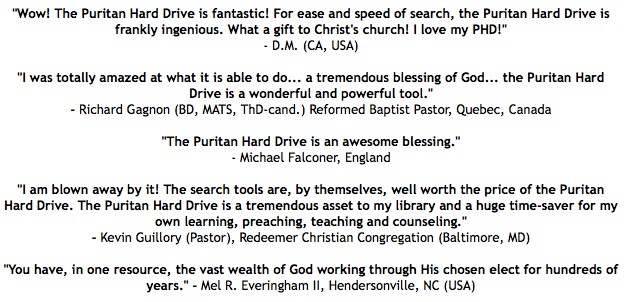 Loading... Please wait...
Loading... Please wait...Pastor Scott Brown, on the left in the video above, is the Director of the National Center for Family-Integrated Churches (NCFIC)
Resource Categories
- PURITAN HARD DRIVE REVIEWS
- PASTOR ROB VENTURA ON THE PURITAN HARD DRIVE
- DR. VODDIE BAUCHAM, JR. ON THE PURITAN HARD DRIVE
- R. C. SPROUL ON SWRB
- DR. JOEL R. BEEKE ON THE PURITAN HARD DRIVE
- PASTOR GREG L. PRICE ON THE PURITAN HARD DRIVE
- DR. MATTHEW MCMAHON ON THE PURITAN HARD DRIVE
- PASTOR SCOTT BROWN ON THE PURITAN HARD DRIVE
- PASTOR W. J. MENCAROW ON THE PURITAN HARD DRIVE
- JOAQUIN FERNANDEZ ON THE PURITAN HARD DRIVE
- PASTOR DAVID SILVERSIDES ON THE PURITAN HARD DRIVE
- JOHN HENDRYX ON THE PURITAN HARD DRIVE
- PASTOR KEVIN GUILLORY ON THE PURITAN HARD DRIVE
- RICHARD BENNETT ON THE PURITAN HARD DRIVE
- DR. KENNY RHODES ON THE PURITAN HARD DRIVE
- JUSTIN RAWSON ON THE PURITAN HARD DRIVE
- PASTOR JAMES WALLACE ON THE PURITAN HARD DRIVE
- PASTOR RICHARD GAGNON ON THE PURITAN HARD DRIVE
- PASTOR JOE HAYNES ON THE PURITAN HARD DRIVE
- DR. STEVEN DILDAY ON THE PURITAN HARD DRIVE
- PASTOR ANDREW COMPTON ON THE PURITAN HARD DRIVE
- TERENCE ELLARD ON THE PURITAN HARD DRIVE
- PASTOR JERRY JOHNSON ON THE PURITAN HARD DRIVE
- PASTOR DAVID PETRIE ON THE PURITAN HARD DRIVE
- JIM DODSON ON THE PURITAN HARD DRIVE
- PASTOR BRIAN SCHWERTLEY ON THE PURITAN HARD DRIVE
- PASTOR PHIL GIBSON ON THE PURITAN HARD DRIVE
- MEL R. EVERINGHAM II ON THE PURITAN HARD DRIVE
- PAUL BLYTH ON THE PURITAN HARD DRIVE
- STEVE KETTLER ON THE PURITAN HARD DRIVE
- D. M. (CALIFORNIA) ON THE PURITAN HARD DRIVE
- MICHAEL CAUGHRAN ON THE PURITAN HARD DRIVE
- WIILIAM NOPPER IV ON THE PURITAN HARD DRIVE
- LINDA THERIAULT ON THE PURITAN HARD DRIVE
- WILLIAM WARNOCK ON THE PURITAN HARD DRIVE
- ROBERT KOH ON THE PURITAN HARD DRIVE
- WHAT'S ON THE PURITAN HARD DRIVE?
- ALL PURITAN HARD DRIVE VIDEOS
- PHD-ODE INSTALLATION VIDEOS
- COMMENTS ON SWRB
- ALL PURITAN QUOTE VIDEOS
- PURITAN HARD DRIVE SCREENSHOTS
- PURITAN HARD DRIVE MINISTRY AND DONATION OFFERS
- TABLE OF RESOURCE CATEGORIES
- Advanced Studies
- SWRB SERMONAUDIO MOBILE APP
- Apologetics
- Assurance
- Attributes and Holiness of God
- Augustine
- Banner of Truth
- Baptism
- Beginners
- Bibles (Geneva, KJV, Hexapla, etc.)
- Biblical Counseling
- BIBLICAL HD COLLECTION
- Biblical Interpretation (Hermeneutics)
- Biographies and Autobiographies
- Calvinism and the Sovereignty of God
- CALVINISM HD COLLECTION
- CALVINIST CLASSICS HD COLLECTION
- Charles Spurgeon
- Children's Books
- CHRISTIAN EDUCATION HD COLLECTION
- Christian History
- Church Government
- Civil Government and Resistance
- CLASSIC CHRISTIAN HD COLLECTION
- Classic Puritan and Reformed Sets
- Commentaries
- Contemporary Issues
- Covenant Theology and Covenanting
- COVENANTER HD COLLECTION
- Covenanters and Covenanted Reformation
- Creation and Creationism
- Creeds, Confessions and Covenants
- Cults, False Religions, Psychology, Humanism
- Dealing with Affliction, Suffering, and Sickness
- Debates
- Dutch Reformed
- Education and Home Schooling
- English Puritans, Covenanters and Reformers
- Family, Children, Home, and Family Worship
- First Reformation
- Five Points of Calvinism (TULIP)
- For Pastors and Elders
- For Seminary Students
- FREE PURITAN & REFORMATION MP3 AUDIO SERMONS/BOOKS
- FREE PURITAN BOOKS, REFORMATION MP3s, PDFs, VIDEOs
- George Gillespie
- God's Law, The Ten Commandments, etc.
- Greg L. Price on Headcoverings
- Heaven, Hell and the Final Judgment
- Holy Days (Lord's Day, Christmas, Easter, etc.)
- HOME SCHOOL HD COLLECTION
- Intermediate Studies
- John Bunyan
- John Calvin
- John Knox
- John Owen
- Jonathan Edwards
- Justification
- Languages, Dictionaries, Reference, etc.
- LOOK WHO LOVES THE PURITAN HARD DRIVE
- Lord's Supper (Communion)
- Marriage, Courtship, etc.
- Martin Luther and Lutheranism
- Martyrs and Persecution
- Other Protestant Works
- Predestination and Providence
- PRESBYTERIAN HD COLLECTION
- Presbyterians and Presbyterianism
- Prophecy, Antichrist, and Eschatology
- PROTESTANT HD COLLECTION
- PSALM SINGING MP3s (COMPLETE SET)
- Psalters, Psalm Singing and Music
- Puritan Facts
- PURITAN FAST SERMONS (1640-1653) - 34 VOLS SET
- Puritan Fast Sermons 1640-1653
- PURITAN HARD DRIVE
- Puritans and Puritanism
- REFORMATION HD COLLECTION
- Reformation History
- Reformed and Puritan Classics
- Reformed Baptist
- REFORMED BAPTIST HD COLLECTION
- REFORMED HD COLLECTION
- REFORMED PRESBYTERIAN HD COLLECTION
- Reformed Presbytery, RPNA Protesters, etc.
- Reformed Theology
- Reformed Worship, The Regulative Principle, etc.
- Roman Catholicism, the Jesuits, Islam, etc.
- Salvation and Evangelism
- Samuel Rutherford
- Sanctification, Prayer and Holiness
- Scottish Covenanters
- Scottish Presbyterianism
- Scripture Song MP3s (Psalms and Bibles Verses)
- Second Reformation
- Separation, Unity, Uniformity, etc.
- Sermons and Sermon Collections
- Solemn League and Covenant
- Theology and Doctrine
- Third Reformation
- Thomas Watson
- Westminster Confession, Assembly and Divines
- Authors (All A to Z)
Phone Orders:
(780) 450-3730
To obtain free Reformation books, Puritan MP3s and Calvinistic videos, SWRB discount coupons, etc., add yourself to SWRB's Puritan and Reformed email list by using the form above.
- Home
- Free Resources
- Free Puritan Books, Reformed MP3s, and Calvinist Videos
- Looking Unto Jesus by Isaac Ambrose (An Excerpt)
Looking Unto Jesus by Isaac Ambrose (An Excerpt)
"Looking unto Jesus the author and finisher of our faith; who for the joy that was set before him endured the cross, despising the shame, and is set down at the right hand of the throne of God." - Hebrews 12:2, KJV
"I determined not to know anything among you, (said Paul), except Jesus Christ, and Him crucified." He resolved himself, before he preached among the Corinthians, that this should be the only point of knowledge that he would profess himself to have skill in; and that in the course of his ministry he would labor to bring them to. This he made the breadth, and length, and depth, and height of his knowledge; "yea, doubtless, (says he), and I count all things but loss for the excellency of knowledge of Christ Jesus my Lord." Eph. 3:18, Phil. 3:8.
In this knowledge of Christ, there is an excellency above all other knowledge in the world; there is nothing more pleasing and comfortable, more animating and enlivening, more ravishing and soul contenting; only Christ is the sun and center of all divine revealed truths, we can preach nothing else as the object of our faith, as the necessary element of your soul's salvation, which does not some way or other, either meet in Christ, or refer to Christ; only Christ is the whole of man's happiness, the Sun to enlighten him, the Physician to heal him, the Wall of fire to defend him, the Friend to comfort him, the Pearl to enrich him, the Ark to support him, the Rock to sustain him under the heaviest pressures, "As a hiding place from the wind, and a covert from the tempest, as rivers of waters in a dry place and as the shadow of a great rock in a weary land." Isa. 32:2. (emphases added)
Only Christ is that ladder between earth and heaven, the Mediator between God and man, a mystery, which the angels of heaven desire to pry, and peep, and look into. 1 Pet. 1:12. Here is a blessed subject indeed; who would not be glad to pry into it, to be acquainted with it? "This is life eternal, to know God, and Jesus Christ whom He hath sent." John 17:3. Come then, let us look; on this Sun of righteousness: we cannot receive harm but good by such a look; indeed by looking long on the natural sun, we may have our eyes dazzled, and our faces blackened; but by looking unto Jesus Christ, we shall have our eyes clearer, and our faces fairer; if "the light of the eye rejoice the heart." Prov. 15:30, how much more, when we have such a blessed object to look upon? As Christ is more excellent than all the world, so this sight transcends all other sights; it is the epitome of a Christian's happiness, the quintessence of evangelical duties, "Looking unto Jesus."
In the text we have the act and object. The act in the original is very emphatical, (aphorontes eis), the English does not fully express it; it signifies an averting or drawing off the eye from one object to another; there are two expressions (apo and eis); the one signifies a turning off the eye from all other objects; the other is a fixing of the eye upon one object. So it is both a looking off and a looking on. On what must we look? This is the object, a "looking unto Jesus"; a title that denotes His mercy and bounty, as Christ denotes his office and function. I shall not be so curious as to inquire why Jesus , and not Christ is nominated; I suppose the person is aimed at, which implies them both; only this may be observed, that Jesus is the purest gospel-name: Jesus was not the dialect of the Old Testament; the first place that ever we read of this title as given to Christ, is in Matt. 1:21 - "Thou shalt call His Name Jesus, for He shall save His people from their sins." Some observe that this name Jesus was given Him twice; once till death, Matt. 1:21, and afterwards for ever, Phil. 2:10.
The first was a note of His entering into covenant with God, to fulfill the law for us, and to die for our sins; the second was to honor a person, who for His humility was more exalted than any person ever has been, or shall be. First, Jesus was the humble name of His deserving grace; now Jesus is the exalted name of His transcendent glory: at first the Jews did crucify Jesus and His name; and the Apostles did then distrust, whether Jesus was the true Jesus: but now God has raised Him from the dead, and "has highly exalted Him, and given Him a name above every name, that at the name of Jesus every knee shall bow, of things in heaven, and things in earth, and things under the earth." Phil 2:9,10. My meaning is not to insist on this name, in contradiction to other names of Christ; He is often called Christ, and Lord and Mediator, and Son of God, and Emmanuel; why? Jesus is all these, Jesus is Christ, as He is the anointed of God; and Jesus is the Lord, as He has dominion over all the world; and Jesus is Mediator, as He is the reconciler of God and man; and Jesus is the Son of God, as He was eternally begotten before all worlds; and Jesus is Emmanuel, as He was incarnate, and so God with us. Only because Jesus signifies Savior, and this name was given Him upon that very account, "for He shall save His people from their sins," I shall make this my design to look at Jesus more especially as carrying on the great work of our salvation from first to last. This, indeed, is the glad tidings, the gospel, the gospel privilege, and our gospel-duty, "Looking unto Jesus".
But first, we must look off all other things, the note is this, we must take our mind off every thing which might divert us in our Christian race from "looking unto Jesus". (Aphorontes), the first word, or first piece of a word in my text, speaks to us this, hands off, or eyes off from anything that stands in the way of Jesus Christ. This was the Lord's charge to Lot, "Look not behind thee." Gen. 19:17. He was to renounce and detest the lewdness of Sodom and must not even look towards it. "At that day shall a man look to His Maker, and his eyes shall have respect to the Holy One of Israel, and he shall not look to the altars, the work of his hands." Isa. 17:7,8. This was the fruit of God's chastisement on Israel, that he should not give a look to the altars, lest they diverted, or draw his eyes from his Maker. "We look not at the things which are seen, but at the things which are not seen" said Paul, 2 Cor. 4:18. A Christian's aim is beyond visible things. Oh when a soul comes to know what an eternal God is, and what an eternal Jesus is, and what an eternal crown is; when it knows that great design of Christ to save poor souls and to communicate Himself eternally to such poor creatures, this takes off the edge of its desires as to visible temporal things; Oh what are they in comparison?
The preferring of the world before Christ Himself. This is the height of covetousness, and the height of adultery; what, to make the members of Christ the members of an harlot? Those admiring thoughts are Christ's, those pains are Christ's, that love is Christ's, that time, that care, that earnestness is Christ's; they are all Christ's and will you give that which is Christ's unto the world? And prefer the world before Christ with His own? What, live as professed prostitutes, that prefer every one before their husbands? How will this expose you to the scorn of men and angels? At the last day they will come pointing and say, "This is the man that made not God his strength, but trusted in the abundance of his riches; he is the Gadareen that loved his swine more than Christ Jesus, 'Love not the world,'" said John, 1 John 2:15. Christ is never precious in a man's apprehension, so long as the world seems glorious to him. As we begin to relish sweetness in Christ, the world begins to be bitter to us. The more sweetness we taste in the one, the more bitterness we taste in the other.
But why must we look off every thing that diverts our "looking unto Jesus"? Because we cannot look fixedly on Christ, and such things together, and at once; the eye cannot look upwards and downwards at once in a direct line; we cannot seriously mind heaven and earth in one thought, "No man can serve two masters," Matt. 6:24. Because, while we look on these things, we cannot see the beauty that is in Christ. Indeed beauty is the attraction of the soul, the soul must see a beauty in that which it is desiring; but our wishing looks on other things make Christ vile and contemptible in our eyes.
It is according to the very law of marriage, "Therefore shall a man leave father and mother, and cleave to his wife," Gen. 2:24. The Lord Christ marries Himself to the souls of His saints; "I will betroth thee unto Me forever; I will betroth thee unto Me in righteousness, and in judgment, and in loving kindness, and mercies:" Hos. 2:19. And for this cause the soul must forsake all, and cleave unto Christ, as married wives do, we must leave all for our Husband the Lord Jesus; "Hearken, Oh daughter and consider, and incline thine ear; forget also thy own people, and thy father's house," Psa. 45:10.
Christ is a jealous Christ. Now, jealousy is a passion in the soul, that will not endure any sharing in the object beloved: the woman that hath a jealous husband, must leave all her old companions: if she cast any amorous looks or glances after them, the husband will be jealous, and He will be jealous. Christians! Our God "is a jealous God," Exo. 20:5. Our Christ is a jealous Christ; He cannot endure that we should look on any other things, so as to lust after them.
Go forth, Oh you daughters of Zion, lay aside all private and earthly affections, and look upon the Glory of CHRIST. If we will behold the great King, Jesus Christ, in His most excellent Glory (a sight able to satisfy the eye, and to ravish the heart) we must come out of our doors, we must come out of ourselves, otherwise we cannot see His GLORY. We are in ourselves shut up in a dark dungeon, and therefore we are called upon to come forth into the clear light of faith, and with the eyes of faith to behold, in daily meditation, the Glory of Christ Jesus.
Looking Unto Jesus (1658). After a serious illness in the early 1650s, Ambrose wrote this devotional on what the Lord had done for his soul, stressing identification with Jesus in thought and behavior; it soon became a classic of Christ-centered divinity. Ambrose describes numerous aspects of Christ’s ministry. For example, he presents Jesus’ ministry from eternity and his ministry during his life from a nine-point perspective: 1) knowing Jesus, 2) considering Jesus, 3) desiring Jesus, 4) hoping in Jesus, 5) believing in Jesus, 6) loving Jesus, 7) rejoicing in Jesus, 8) calling on Jesus, and 9) conforming to Jesus in a particular aspect of his ministry. Regarding conforming to Christ in his resurrection, Ambrose wrote, “Look much at Christ raised, Christ glorified. [Let us] see our own personal vivification linked inseparably unto, and bottomed immovably upon the resurrection of Christ. When we can by faith get a sight of this, how courageously and successfully the soul will grapple in the controversies of the Lord against the devil, and our own deceitful hearts…. O that I could set my faith more frequently on Christ’s resurrection, so that at last I could see it by the light of God to be a destinated principle of my vivification in particular!” (p. 503). - Excerpted from Joel R. Beeke and Randall J. Pederson, Meet the Puritans: With a Guide to Modern Reprints (Grand Rapids: Reformation Heritage Books, 2006), pp. 11–14, from https://www.meetthepuritans.com/blog/meet-puritans-isaac-ambrose.
Read more about Isaac Ambrose's life (1604-1664) and Looking Unto Jesus (and his other books) at https://www.meetthepuritans.com/blog/meet-puritans-isaac-ambrose.
A larger portion of the book, Looking Unto Jesus: A View of the Everlasting Gospel; Or, the Soul's Eying of Jesus, as Carrying on the Great Work of Man's Salvation, from First to Last, by Isaac Ambrose, is available in audio from SWRB in two free MP3s at https://www.sermonaudio.com/go/303886. The full book (1763 edition) is also free, online, at https://archive.org/details/lookinguntojesus00ambr (in many formats).
Jim Dodson Reviews and Recommends the Puritan Hard Drive

If you love the Bible, then you may well be Reformed. If you think of yourself as Reformed, but you have seldom or have never read older Reformed literature, prepare to be challenged. The Puritan Hard Drive provides primary sources and depth of theological and spiritual insight which is lacking in much of what is passed off as genuine Reformed theology. If you think of yourself as conservative, the older Puritan and Reformed authors will help you sort reality from myth in your quest to be truly Reformed. There are more solid resources for less money here than anywhere else. I highly recommend you take responsibility for your soul and spend a few shekels for this cup of cold water in the midst of the modern religious desert.
- Jim Dodson, Reformed Presbyterian Scholar, https://www.covenanter.org/
Looking Unto Jesus by Isaac Ambrose (An Excerpt)
VIDEO INTRODUCTION TO THE PURITAN HARD DRIVE


Phone Orders:
(780) 450-3730
To obtain free Reformation books, Puritan MP3s and Calvinistic videos, SWRB discount coupons, etc., add yourself to SWRB's Puritan and Reformed email list by using the form above.
Current Top Sellers
-
1
-
2Puritan Hard Drive - On Demand Edition for Windows
$2,897.97$597.97 -
3Puritan Hard Drive - On Demand Edition for Mac
$2,897.97$597.97 -
4
-
5






























